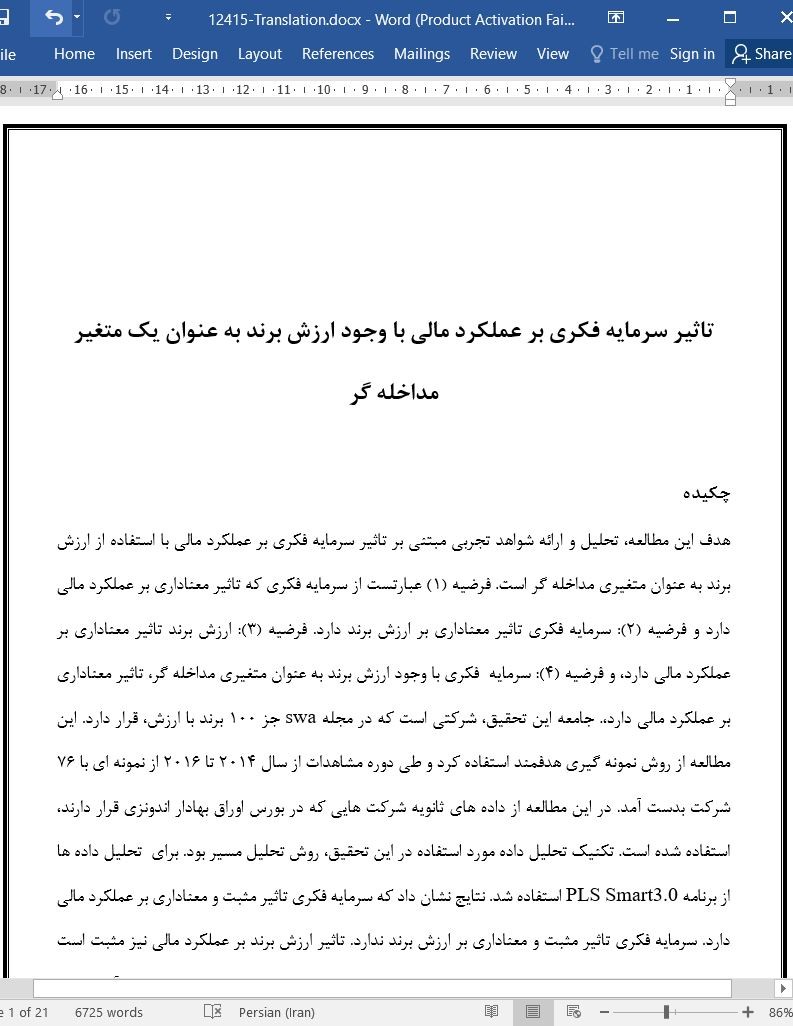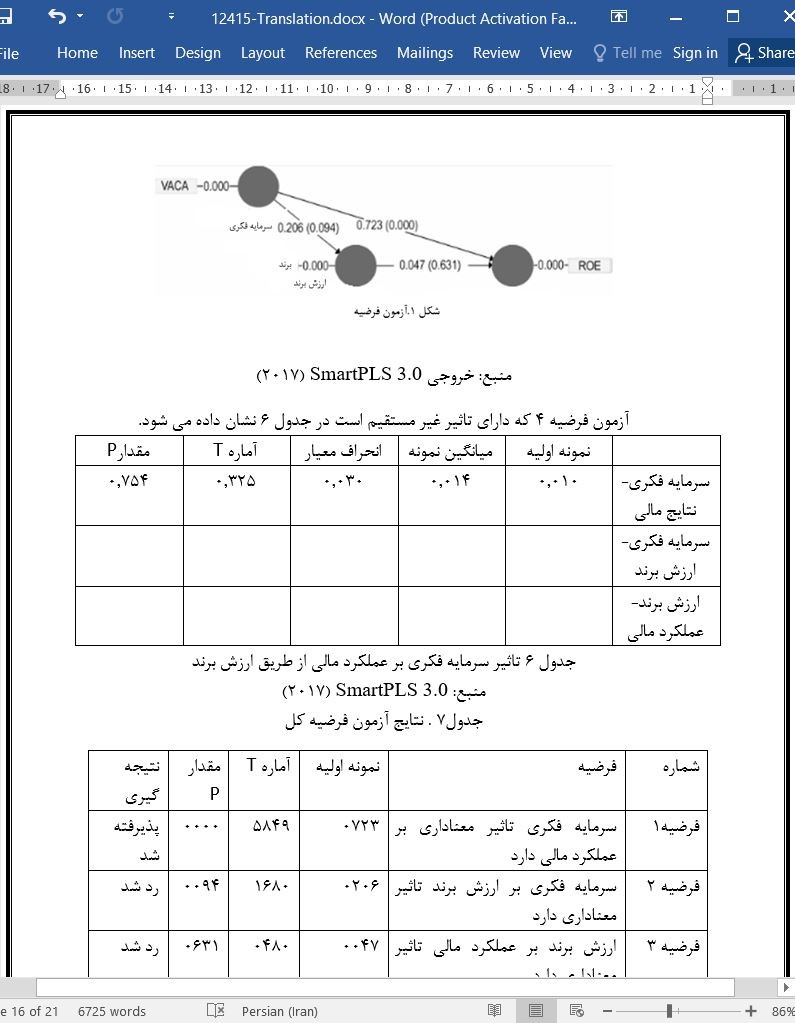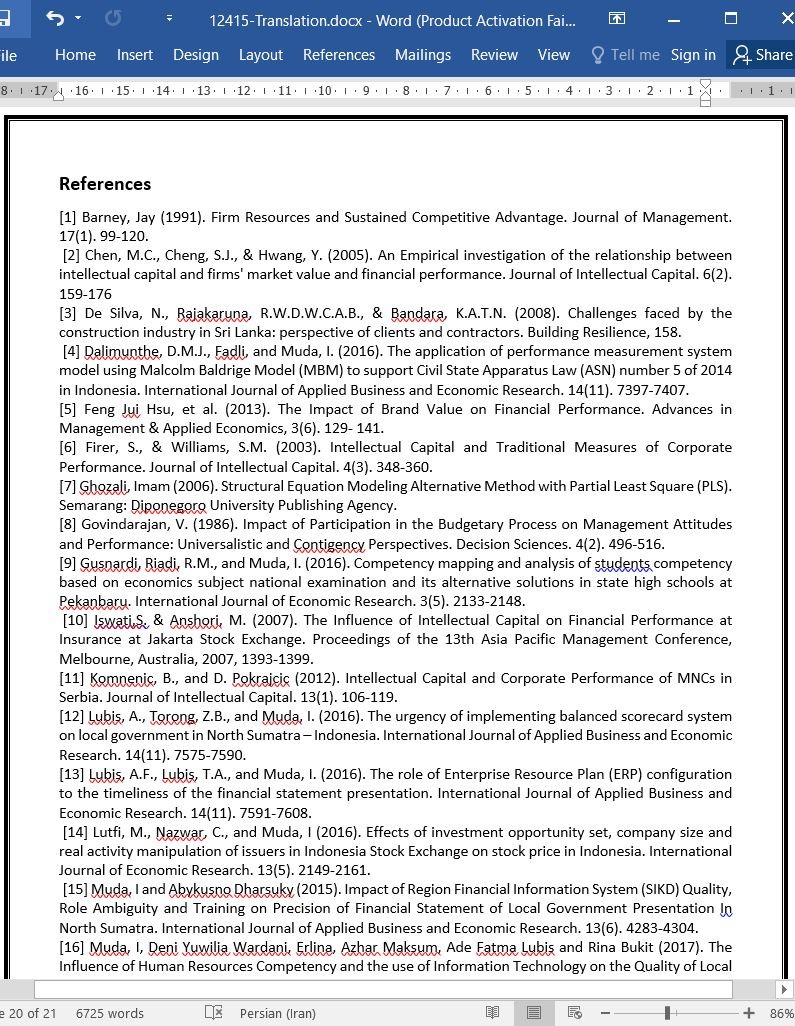
دانلود مقاله تاثیر سرمایه فکری بر عملکرد مالی با وجود ارزش برند
چکیده
هدف این مطالعه، تحلیل و ارائه شواهد تجربی مبتنی بر تاثیر سرمایه فکری بر عملکرد مالی با استفاده از ارزش برند به عنوان متغیری مداخله گر است. فرضیه (1) عبارتست از سرمایه فکری که تاثیر معناداری بر عملکرد مالی دارد و فرضیه (2): سرمایه فکری تاثیر معناداری بر ارزش برند دارد. فرضیه (3): ارزش برند تاثیر معناداری بر عملکرد مالی دارد، و فرضیه (4): سرمایه فکری با وجود ارزش برند به عنوان متغیری مداخله گر، تاثیر معناداری بر عملکرد مالی دارد،. جامعه این تحقیق، شرکتی است که در مجله swa جز 100 برند با ارزش، قرار دارد. این مطالعه از روش نمونه گیری هدفمند استفاده کرد و طی دوره مشاهدات از سال 2014 تا 2016 از نمونه ای با 76 شرکت بدست آمد. در این مطالعه از داده های ثانویه شرکت هایی که در بورس اوراق بهادار اندونزی قرار دارند، استفاده شده است. تکنیک تحلیل داده مورد استفاده در این تحقیق، روش تحلیل مسیر بود. برای تحلیل داده ها از برنامه PLS Smart3.0 استفاده شد. نتایج نشان داد که سرمایه فکری تاثیر مثبت و معناداری بر عملکرد مالی دارد. سرمایه فکری تاثیر مثبت و معناداری بر ارزش برند ندارد. تاثیر ارزش برند بر عملکرد مالی نیز مثبت است ولی معنادار نیست. سرمایه فکری به واسطه ارزش برند، بر عملکرد مالی تاثیر مثبت می گذارد، اما تاثیر آن معنادار نیست. در این مطالعه، ارزش برند به عنوان متغیر مداخله گر، یک متغیر تعدیل گر نسبی بود.
مقدمه
در رابطه با عملکرد، گزارش های مالی، اغلب برای ارزیابی عملکرد شرکت مورد استفاده قرار می گیرد. مطابق صورت های مالی، که از طریق نسبت های مالی مختلف محاسبه می شود، می توان نتیجه گرفت که آیا عملکرد مالی شرکت خوب است یا بد. شرکت هایی که به طور مستمر عملکرد مالی خوبی دارند، شرکت هایی هستند که می توان گفت از نظر مالی خوب و سالم هستند. اگر عملکرد شرکت خوب باشد، سرمایه گذاران برای سرمایه گذاری و وام دهندگان برای دادن اعتبار به شرکت مردد نخواهند شد و دولت پیشنهاد می کند که پروژه هایش توسط این شرکت انجام شود(لاطفی و همکاران، 2016). در نتیجه، شرکت باید در حد امکان، عملکرد مالی خود را حفظ کند و افزایش عملکرد خود را به طور مستمر در گزارش مالی نشان دهد.
مسلم است که حفظ و افزایش عملکرد مالی آسان نیست. شرکت ها باید بتوانند هر چه دارند را افزایش دهند. در عصر جهانی شدن، برای برنده شدن در عرصه رقابت کسب و کار، شرکت نباید تنها بر دارایی های ملموس خود تکیه کند. با شناخت اهمیت دارایی های ناملموس، که نقش مهمی در مزیت رقابتی دارد، اداره کنندگان کسب و کار تلاش می کنند تا به طور موثر و کارا، دارایی ناملموس را مدیریت و از آن استفاده کنند(دالیمونت و همکاران، 2016؛ لوبیس و همکاران، 2016؛ و گاسناردی و همکاران، 2016)، که با افزایش سرمایه گذاری در دارایی های ناملموسی مانند افزایش بودجه تحقیق و توسعه و افزایش بودجه آموزش کارکنان در برخی شرکت ها ارتباط دارد(مودا و دارساکی، 2015). اما متاسفانه دارایی ناملموس با گزارش مالی مربوطه مطابقت ندارد. در زمان گزارش دهی، گزارش مالی شرکت، تنها بر عملکرد مالی تمرکز دارد. اطلاعات دیگری هم وجود دارد، که باید به کاربران صورت های مالی ارائه شود، اطلاعاتی که درباره ارزش شرکت است. ارزش افزوده به شکل نوآوری، اکتشاف، دانش و توسعه کارکنان غالبا سرمایه فکری نامیده می شود.
5. نتیجه گیری
1. سرمایه فکری تاثیر مثبت بر عملکرد مالی دارد. یعنی، هر چه شرکت در ایجاد سرمایه فکری اثربخش تر باشد، عملکرد مالی شرکت افزایش خواهد یافت
2. سرمایه فکری تاثیر معناداری بر ارزش برند ندارد. از میان اجزای مولفه ی VAIC ، تنها دارایی های مالی و فیزیکی در محصول تاثیر موثر دارد، درحالیکه دو مولفه دیگر سرمایه فکری تاثیری ندارند. یعنی شرکت ها برای ایجاد برند، بیشتر از تکنیک های فنی یعنی فعالیت های عملیاتی استفاده می کنند.
3. ارزش برند تاثیر معناداری بر عملکرد مالی ندارد.
4. سرمایه فکری از طریق ارزش برند، تاثیر معناداری بر عملکرد مالی ندارد.
بر اساس نتایج پژوهش پیشنهادات زیر ارائه می شود.
1. انتظار می رود در تحقیقات آتی از متغیرهای مداخله گر دیگری به جز ارزش برند استفاده شود، تا نتایجی متنوع تر و قابل مقایسه ایجاد شود و از دوره های زمانی طولانی تری استفاده شود تا نتایج دقیق تری حاصل شود.
2. انتظار می رود تعداد شرکت های هدف بیشتر باشد. این موضوع اهمیت زیادی برای شرکت دارد، چرا که می تواند نشان دهد توانایی عملکردی شرکت، از سالی به سالی دیگر چقدر است.
Abstract
This study aims to analyze and provide empirical evidence of the effect of intellectual capital on the financial performance using brand value as an intervening variable. The hypothesis is (1) Intellectual Capital a significant effect on the financial performance, (2) Intellectual Capital has a significant effect on brand value, (3) Brand Value significantly influences the company's financial performance, and (4) Intellectual Capital significantly influences the financial performance with the brand value as an intervening variable. The population in this study is a company that includes the Top 100 Most Valuable Brand from Swa Magazine. This study used method purposive sampling and obtained a sample of 76 companies with the observation period from the year 2014 to 2016. This study used secondary data companies listed in Indonesia Stock Exchange. The data analysis technique used was path analysis. Analysis of the data in this study using 3.0 SmartPLS program. Results showed that intellectual capital has a significant positive effect on financial performance. Intellectual capital has no significant positive effect on the brand value. Brand value is also positive and not significant to the financial performance. Intellectual capital positively affects financial performance through brand value, but the impact is not significant. Brand value as an intervening variable in this study was a partial mediating variable.
1. Introduction
In conjunction with the performance, financial reports are often used as the basis for assessing the company's performance. From the financial statements, it can be calculated in various financial ratios, which in turn can be concluded if the company's performance is good or bad. Companies that consistently have a good financial performance of the company can be said to be good or healthy financial. If the company's good performance, investors will not hesitate to invest, the lenders do not hesitate to give credit to the company, and the government will submit its projects to be done by the company (Lutfi et al., 2016). Therefore, as much as possible the company must maintain its financial performance and display it consistently even increased in the financial report.
To maintain and improve its financial performance is certainly not easy. Companies must be able to maximize everything he had. In this globalization era, to win a business competition, the company cannot rely solely on tangible assets. Recognizing the importance of the intangible assets that contribute significantly to the competitive advantage, business people began to try to manage and utilize it effectively and efficiently (Dalimunthe et al., 2016; Lubis et al., 2016 and Gusnardi et al., 2016). It is characterized by the increasing investment in intangible assets such as a budget increase Research and Development and an increase in the budget for the training of employees in some companies (Muda and Dharsuky, 2015). But unfortunately this is not matched by corresponding financial reporting. During this time the company's financial reporting focuses only on financial performance. There is some other information that needs to be delivered to users of financial statements, which is about the value of the company. The added value in the form of innovation, discovery, knowledge, and the development of employees are often termed as Intellectual Capital.
5. Conclusions
1. Intellectual Capital has a positive effect on financial performance. That is, the more efficient the company that builds its intellectual capital, the financial performance will increase.
2. Intellectual capital has no significant effect on brand value. From the elements of the VAIC component, only the physical and financial assets (CEE) are positively energized in the product, while the two components of intellectual capital do not show any influence. That is, companies are more utilizing technical things, namely the operational activities that create the brand.
3. Brand value has no significant effect on financial performance.
4. Intellectual capital has no significant effect on financial performance through brand value.
The suggestions based on the results of the research:
1. For further researchers it is expected to use intervening variables other than brand value to be more varied and comparable, and use longer observation periods to make the results more accurate.
2. For companies that become the object of research is expected to be more. This is very important for the company, because it can show how much the ability of the company in its performance capacity from year to year.
H1- Intellectual Capital significantly influences the financial performance
H2 - Intellectual Capital significantly influences the Brand Value
H3 - Brand Value significantly influences the financial performance
H4 - Intellectual Capital significantly influence the financial performance through the Brand Value
فرضیه 1- سرمایه فکری تاثیر معناداری بر عملکرد مالی دارد
فرضیه 2 - سرمایه فکری بر ارزش برند تاثیر معناداری دارد
فرضیه 3 - ارزش برند بر عملکرد مالی تاثیر معناداری دارد
فرضیه 4 - سرمایه فکری از طریق ارزش برند بر عملکرد مالی تاثیر معناداری دارد
چکیده
مقدمه
1.مروری بر تحقیقات پیشین
1.1. مرور نظری
2.1.1. دیدگاه مبتنی بر منابع
2.1.2.سرمایه فکری
2.1.3.ضریب ارزش افزوده سرمایه فکری(VAIC)
2.1.4. عملکرد مالی
2.1.5. عوامل تشکیل دهنده اصلی شرکت
2.1.6. ارزش برند
2. روش شناسی
3.1. نوع پژوهش
3.2 اندازه گیری متغیر
3.2.1 روش سرمایه فکری
3.2.2.ارزش برند
3.2.3عملکرد مالی
3.2.4متغیرهای کنترل
3.2.4.1عوامل تشکیل دهنده بنیادین شرکت
3.2.5تکنیک تحلیل داده
4. نتایج و بحث
4.1 نتایج
4.2 بحث
4.2.1. تاثیر سرمایه فکری بر عملکرد مالی
4.2.2. تاثیر سرمایه فکری بر ارزش برند
4.2.3. تاثیر ارزش برند بر عملکرد مالی
4.2.4. تاثیر سرمایه فکری بر عملکرد با ارزش افزوده به عنوان متغیر مداخله گر
5 نتیجه گیری
منابع
Abstract
1. Introduction
1. Literature Review
1.1. Theoretical Review
2.1.1. Resource Based Theory
2.1.2. Intellectual Capital
2.1.3. Value Added Intellectual Capital Coefficient (VAIC)
2.1.4. Financial Performance
2.1.5. Company Fundamental
2.1.6. Brand Value
2. Method
3.1. Type of Research
3.2. Measurement of Variable
3.2.1. Intellectual Capital Method
3.2.2. Brand Value
3.2.3. Financial Performance
3.2.4. Control Variables
3.2.4.1. Fundamental Company
3.2.5. Data Analysis Techniques
4. Results and Discussion
4.1. Results
4.2. Discussion
4.2.1. The Influence of Intellectual Capital against Financial Performance
4.2.2. The Influence of Intellectual Capital against Brand Value
4.2.3. The Influence of Brand Value against Financial Performance
4.2.4. Intellectual Capital Effect on Performance with Added Value as Intervening Variable
5. Conclusions
References
- اصل مقاله انگلیسی با فرمت ورد (word) با قابلیت ویرایش
- ترجمه فارسی مقاله با فرمت ورد (word) با قابلیت ویرایش، بدون آرم سایت ای ترجمه
- ترجمه فارسی مقاله با فرمت pdf، بدون آرم سایت ای ترجمه



